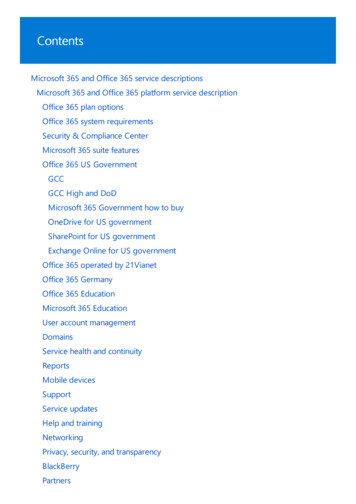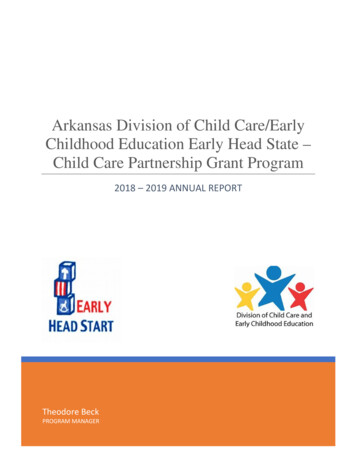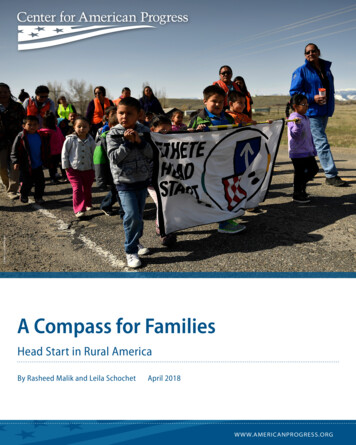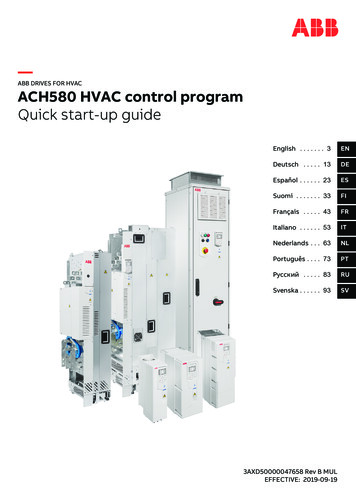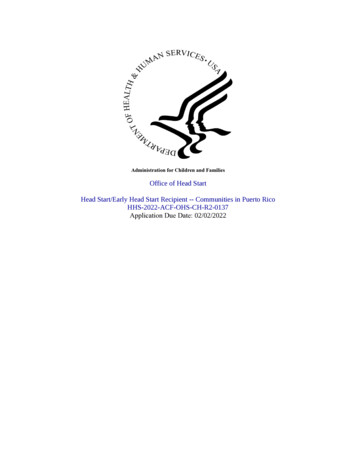
Transcription
Administration for Children and FamiliesOffice of Head StartHead Start/Early Head Start Recipient -- Communities in Puerto RicoHHS-2022-ACF-OHS-CH-R2-0137Application Due Date: 02/02/2022
Table of ContentsExecutive Summary .2I. Program Description.3II. Federal Award Information .8III. Eligibility Information .11III.1. Eligible Applicants .11III.2. Cost Sharing or Matching .12III.3. Other.13IV. Application and Submission Information .15IV.1. Address to Request Application Package .15IV.2. Content and Form of Application Submission .16Required Forms, Assurances, and Certifications .22The Project Description .26The Project Budget and Budget Justification .34Application Submission Options .40IV.3. Unique Entity Identifier and System for Award Management (SAM) .44IV.4. Submission Dates and Times .44Explanation of Due Dates .45Acknowledgement of Received Application .46IV.5. Intergovernmental Review .46IV.6. Funding Restrictions .47IV.7. Other Submission Requirements .47V. Application Review Information .48V.1. Criteria.48The Review Criteria - Lead-In Paragraph .48V.2. Review and Selection Process .53V.3. Anticipated Announcement and Federal Award Dates .57VI. Federal Award Administration Information .57VI.1. Federal Award Notices .57VI.2. Administrative and National Policy Requirements .57VI.3. Reporting .59VII. HHS Award Agency Contact(s) .59VIII. Other Information .60Reference Websites .60Page 1 of 67
Application Checklist .61Appendix.65Funding Opportunity Title:Head Start/Early Head Start Recipient -- Communities in Puerto RicoAnnouncement Type:InitialFunding Opportunity Number:HHS-2022-ACF-OHS-CH-R2-0137Primary CFDA Number:93.600Due Date for Applications:02/02/2022Executive SummaryNotice: Applicants are strongly encouraged to read the entire notice of fundingopportunity (NOFO) carefully and observe the application formatting requirementslisted in Section IV.2. Content and Form of Application Submission. For moreinformation on applying for grants, please visit "How to Apply for a Grant" on theACF Grants & Funding Page at https://www.acf.hhs.gov/grants/how-apply-grant.The federally funded Head Start program provides high-quality, comprehensive early educationprogramming to low-income children and families so that children start school ready to succeed.The Office of Head Start (OHS) is offering applicants the opportunity to apply for funding toserve pregnant women, infants, toddlers, and children from birth to compulsory school age inone application. This NOFO solicits applications from public or private non-profit organizations,including faith-based organizations or for-profit organizations, that seek to provide a highquality, comprehensive program incorporating both Head Start and Early Head Start(EHS) funding, or to provide services for Head Start only or EHS only, in a manner that ensurescontinuous services and seamless transitions for children and families residing in two specificallydefined service area(s) in Puerto Rico. Funding is limited to only the individually defined serviceareas listed in the Appendix section of this funding opportunity.The goal of this NOFO is to ensure the distribution of resources to meet the demonstratedcommunity needs of children from birth to compulsory school age, ensuring continuity ofservices and taking into account the availability of high-quality and comprehensive earlychildhood education opportunities (which may include public pre-kindergarten programs for 4year-olds). Applicants proposing to serve pregnant women are expected to serve the newbornthrough the EHS program. Applicants should thoughtfully consider their reason for deciding toapply to conduct a program to serve the proposed population, including the particular age groupof children and, if applicable, pregnant women. This decision should be based on the needs ofthe community. This NOFO provides applicants the opportunity to propose to reallocate fundingbetween Head Start and EHS based on both the needs in the community and the applicant'scapacity and experience serving pregnant women, infants, toddlers, and/or preschool-agePage 2 of 67
children. Applicants may explore combining Head Start and EHS funds with resources fromother early childhood programs or funding streams, including state, local, and private sectorfunding for child care, pre-kindergarten, and special education services. Please note thatapplicants responding to this NOFO will be expected to begin providing Head Start and/or EHSservices quickly after award, with a minimal start-up period, to support limited to no disruptionin services to the currently enrolled children and families in this service area.Any applicant responding to this NOFO must submit only one application per each service areanoted in the Appendix section, whether the applicant is proposing to provide 1) Head Startservices only, 2) EHS services only, or 3) both Head Start and EHS services. Applicant entitiesmay submit only one application per service area regardless of how they choose to apply. TheAdministration for Children and Families (ACF) will review only one application for a servicearea from any applicant. For more information, please see Section IV.2. Content and Form ofApplication Submission.Please Note: Applicants should submit applications that are based on the projected number ofchildren that can be served in a post-Coronavirus Disease (COVID-19) environment without thephysical distancing restrictions currently in place due to COVID-19.I. Program DescriptionStatutory AuthorityThe Head Start program is authorized by the Head Start Act, 42 U.S.C. 9831 et seq.DescriptionProgram Background and PurposeThe Head Start program is administered by ACF, an operating division (OPDIV) of the U.S.Department of Health and Human Services (HHS). ACF intends to fund applications thatdemonstrate an organization's commitment and capacity to operate a Head Start and/or EarlyHead Start (EHS) program that raises the quality of early care and education in the communityand helps children start school ready to succeed. School readiness requires that children arecognitively, physically, socially, and emotionally prepared to continue to make progress as theyenter kindergarten. ACF is seeking applicants that are able to use the best evidence-based earlyeducation practices in their programs to support high-caliber classroom instruction, home visitingservices, and effective family engagement and health promotion.The Head Start and EHS programs provide grants to public and private non-profit and for-profitagencies to provide comprehensive child development services to predominately economicallydisadvantaged children and families. Head Start's primary purpose is to prepare children to beready for school. In fiscal year (FY) 1995, the EHS program was established to serve pregnantwomen and children from birth to 3 years of age in recognition of the mounting evidence that theearliest years matter a great deal to children's growth and development. Since its beginning in1965, Head Start has served more than 37 million children and their families. In FY 2020, HeadStart was funded to serve 852,501 children and families; of these, 185,344 were funded inthe EHS program. Currently there are approximately 1,600 Head Start recipients,including approximately 1,100 recipients providing EHS.Head Start and EHS programs must provide, directly or through referral, early, continuous,Page 3 of 67
intensive, and comprehensive child development and family support services that will enhancethe physical, social, emotional, and intellectual development of participating children in the keydomains of physical development and health; social and emotional development; approaches tolearning, language, and literacy; cognition; and general knowledge. Programs support parentengagement in their roles as their children’s teachers and advocates, and help parents movetoward self-sufficiency. Head Start promotes school readiness by addressing the key domains oflanguage, literacy, mathematics, science, and social and emotional development.Head Start and EHS programs emphasize family engagement because of the critical role thatparents play in supporting their children's healthy development and school success. Effectiveprograms engage parents in their children's development and learning. Programs also emphasizethe significant involvement of parents in the administration of local Head Start and EHSprograms. These leadership opportunities are designed to strengthen skills that parents can applyto improving their family's economic well-being and to becoming more effective advocates fortheir children.Program ApproachHead Start and EHS are designed to increase the number of low-income children receiving highquality, comprehensive early education services that help facilitate healthy development,including physical and social/emotional development, and prepare them for school success. Tomeet this goal, it is critical that funds awarded through this NOFO do not supplant existingservices. Given the need for continuity of care to support the rapid development in the earliestyears, OHS expects that recipients will serve pregnant women, infants, and toddlers for at least1,380 annual hours, as required in 45 CFR § 1302.21(c), unless approved for a locally-designedoption. OHS expects that recipients will implement a full-year model, as described in 45 CFRPart 1302 Subpart B, that will require per-child costs that, in most circumstances, will be higherthan the costs needed to provide part-year services. Applicants are encouraged to use thisopportunity to design a model of services and program options that best meet the needs ofchildren and families over time, including helping to meet the child care needs of parents.Applicants are encouraged to bring new and innovative ideas that are evidence-based orevidence-informed to maximize the extent to which EHS and Head Start, in collaboration withother partners and early childhood education providers, can prepare children and their familiesfor school.Program ModelACF is interested in new and innovative models that provide continuous and seamless servicesfor pregnant women, children, and their families. These models should be designed to beresponsive to community needs; be evidence-based or evidence-informed; and maximize theextent to which the EHS and Head Start resources, in collaboration with other partners and earlychildhood education providers, can prepare children and their families for school.Eligible ParticipantsHead Start serves children when they are at least 3 years old by the date used to determineeligibility for public school in the community where the Head Start program is located. EHSprograms enroll pregnant women and infants and toddlers from birth to age 3. Families mustPage 4 of 67
either have incomes below the poverty line or be eligible for public assistance in order to beincome eligible for Head Start or EHS programs. In addition, homeless children and children infoster care are categorically eligible for services. Children are selected for enrollment based onage, income eligibility, and relative level of need with regard to other criteria that are identifiedwithin each community (45 CFR § 1302.12(b) and (c)).Head Start regulations permit up to 10 percent of enrolled participants to be from families that donot meet these low-income criteria. A provision in the Head Start Act, as discussed in 42 U.S.C.§ 9840(a)(1)(B), which is applicable to both Head Start and EHS, allows recipients that canensure that all eligible children, including homeless children, are served, to enroll up to anadditional 35 percent of its participants from families with incomes greater than or equal to 100percent, but less than 130 percent, of the poverty line. It is not expected, however, given therelatively low EHS participation rates, that the provisions of 42 U.S.C. § 9840(a)(1)(B) regardingserving up to 35 percent of a program’s enrollment from families with incomes up to 130 percentof the poverty line would apply for this announcement.Additionally, programs must ensure that at least 10 percent of the total number of childrenenrolled by the Head Start or EHS agency and delegates are children with disabilities unless awaiver is granted.Applicants may elect to propose program models that promote socioeconomic diversity withinclassrooms. Federal Head Start funds must be used to serve eligible children as described in thissection. Additional children who are not income-eligible for Head Start or EHS can be served solong as their participation is supported through other funding sources, including child caresubsidies, public school pre-kindergarten allocations, parent-paid tuition, or other sources. Suchprogram designs may be beneficial in promoting socioeconomic diversity within classrooms. Allcosts must be allocated to appropriate funding sources in compliance with federal requirements.Head Start Program Performance StandardsIn addition to the Head Start Act, 42 U.S.C. 9831 et seq., Head Start is governed by the HeadStart Program Performance Standards (HSPPS) that define the scope of services necessary tosupport children's development and school readiness. These program performance standards arefound in 45 CFR Parts 1301-1305 iii. TheHSPPS are the foundation on which programs design and deliver comprehensive, high-qualityindividualized services to support the school readiness of children from low-income families.The program performance standards set forth the requirements local recipients must meet tosupport the cognitive, social, emotional, and healthy development of children from birth to age 5.They encompass requirements to provide education, health, mental health, nutrition, and familyand community engagement services, as well as rules for local program governance and aspectsof federal administration of the program.FacilitiesFunded recipients proposing facility purchase, construction, or renovation will be required tomeet the requirements in 45 CFR Part 1303 Subpart E – Facilities. This subpart prescribes what arecipients must establish to show it is eligible to purchase, construct, and renovate facilities asoutlined in section 644(c), (f), and (g) of the Act. It explains how a recipients may apply forPage 5 of 67
funds; details what measures a recipients must take to protect federal interest in facilitiespurchased, constructed, or renovated with grant funds; and concludes with other administrativeprovisions. This subpart applies to major renovations. It only applies to minor renovations andrepairs, when they are included with a purchase application and are part of purchase costs.As a component of the facilities request, recipients must also submit the relevant SF-429 RealProperty Status Report and Request form(s), along with supporting documentation, inGrantSolutions Online Data Collection (GS/OLDC) system. These are standard forms to be usedby recipients of federal financial assistance to report real property status (Attachment A) or torequest instructions on real property (Attachment B, C) acquired (i.e., purchased or constructed)in whole or in part under a federal award. This includes real property (owned and/ leased)improved using federal funds. These reports are used for awards that establish a federal intereston real property. Recipients that incur costs to purchase, construct, or improve real propertybefore receiving official ACF approval, typically via the Notice of Award (NoA), do so at theirown risk. Federal interest does not expire until disposition has been requested by the recipientusing the SF-429 Attachment C in GS/OLDC and approved by ACF. For more information, seeReal Property Guidance.Mortgages and Long-Term Lease AgreementsIf so directed by OHS, the newly funded recipient must accept assignment of any existingmortgages, long-term lease agreements, or security agreements (in the case of a modular unit) onproperties subject to a federal interest occupied by the current recipient. By accepting thiscondition, the recipient must comply with real property and reporting requirements, includingsubmission of the SF-429 Attachment A on an annual basis until disposition is approved byACF. For more information, see Real Property Guidance.If a recipient intends to finance, refinance, or amendment a financing arrangement on a realproperty or real property project, the SF-429 Attachment C must be submitted, along withsupporting documentation, in GS/OLDC. This is considered an encumbrance that requires ChiefGrants Management Officer decision, which may delay recipients. Recipients that proceed onthese arrangements before receiving official ACF approval do so at their own risk. For moreinformation, see Real Property Guidance.Non-Federal MatchRecipients must, unless a waiver is granted, contribute 20 percent of the total cost of the programfrom non-federal funds. A waiver may be granted for any of the grounds listed in 42 U.S.C.9835(b) (45 CFR § 1303.4).For awards that contain real property projects, any portion of the cost of purchase, construction,or renovation contributed by or for the entity, or a related donor organization, to satisfy amatching requirement, per 45 CFR §1303.44(c) and 1305.2, becomes part of the federal share ofthe facility. Unless recipient equity contributions (sources) are used and meets the following: 1)are non-Head Start related funds (e.g., unrestricted funds such as income unrelated to Head Start,donations, and contributions), 2) not used as match on the facility or related activities (45 CFR§1303.44(c)), 3) not included in the Head Start grant (45 CFR §1303.4), and 4) not used in otherfederal funding sources (45 CFR §75.306(b)(5)).Page 6 of 67
Administrative Cost WaiverNo more than 15 percent of total costs may be used for program administration. An HHS officialmay grant a waiver of the 15 percent limitation on allowable development and administrationcosts for a Head Start or EHS program approving a higher percentage for a specific period oftime not to exceed 12 months (45 CFR § 1303.5).Oversight and Monitoring ReviewsOHS is responsible for monitoring the quality of Head Start and/or EHS program services andthe recipient's compliance with federal and other applicable requirements, and to provide accessto T/TA as needed. The federal government uses several mechanisms to conduct its oversight,including ongoing communication with ACF regional offices and periodic site visits. Federalmonitoring reviews are required by the Head Start Act. Over the course of the project period,reviews are conducted to ensure compliance with the HSPPS and other applicable regulations.Monitoring reviews may occur onsite or offsite, and include compliance with health and safetyrequirements, rules related to children's eligibility for the program, and financial managementrequirements.Federal EvaluationAs a condition of acceptance of an award under this NOFO, all recipients are required toparticipate fully in ACF-sponsored evaluations and adhere to all evaluation protocols establishedby ACF to be carried out by its designee contractors.ACF-led evaluations are subject to Office of Management and Budget (OMB) approval underthe Paperwork Reduction Act. ACF will obtain OMB approval prior to requiring recipients torespond to a collection of information.SubawardsRecipients under this grant program may opt to transfer a portion of substantive programmaticwork to other organizations through subaward(s). The prime recipient must maintain asubstantive role in the project. ACF defines a substantive role as conducting activities and/orproviding services funded under the award that are necessary and integral to the completion ofthe project. Subrecipient monitoring activities alone as specified in 45 CFR § 75.352 do notconstitute a substantive role. Furthermore, ACF does not fund awards where the role of theapplicant is primarily to serve as a conduit for passing funds to other organizations unless thatarrangement is authorized by statute.Subrecipient(s) must meet the eligibility requirements identified in the NOFO, Section III.1.Eligible Applicants. Additionally, all subrecipient(s) must obtain a Data Universal NumberingSystem (DUNS) number, or after government-wide implementation, a Unique Entity Identifierassigned by the System for Award Management (SAM), if they do not already have one. Primerecipients are required to check the SAM to verify that the subrecipient(s) is/are not debarred,suspended, or ineligible.Please reference the Award Term and Condition on Subawards on the ACF Administrative andNational Policy Requirements website for further requirements involving subawards.Page 7 of 67
COVID-19 RESPONSEIf, during the project period, OHS and/or recipients are required to adjust program and/or grantrequirements due to COVID-19 or other emergency, OHS will exercise maximum flexibilities asneeded. Requirements may be conducted virtually or timelines may be modified in consultationwith OHS.II. Federal Award InformationFunding Instrument Type:G (Grant)Estimated Total Funding: 14,463,492Expected Number of Awards:5Award Ceiling: 14,463,492Per Budget PeriodAward Floor: 1,000,000Per Budget PeriodAverage Projected Award Amount: 0Per Budget PeriodAnticipated Project Start Date:07/01/2022Length of Project Periods:60-month project period with five 12-month budget periodsAdditional Information on Project Periods and Explanation of 'Other'Additional Information on Awards:Awards made under this funding opportunity are subject to the availability of federalfunds.Expected Number of AwardsPlease note that the expected number of awards represents an estimated total range of awardsthat OHS might make as the result of this funding opportunity, inclusive of all services areaslisted later on in the Appendix section. If the expected number of awards is 1, applicants areexpected to submit proposals for the entire service area. If the expected number of awards is 2 orgreater, applicants may submit 1 application to apply to serve either the entire service area, or aportion of the service area.Page 8 of 67
Award Ceiling DisqualificationApplications requesting an award amount that exceeds the Award Ceiling per budget period orper project period, as stated in this section, will be disqualified from competitive review andfrom funding under this funding opportunity. This disqualification applies only to the AwardCeiling listed for the first 12-month budget period for projects with multiple budget periods. Ifthe project and budget period are the same, the disqualification applies to the Award Ceilinglisted for the project period. Please see Section III.3. Other, Application DisqualificationFactors.Inclusion of start-up/pre-award costs in the application submission is not subject to the “AwardCeiling Disqualification” that is explained in Section III.3. Other, Application DisqualificationFactors. However, if an applicant does not segregate start-up/pre-award costs from the basefunding award request (SF-424, line 18a, Federal), the “Award Ceiling Disqualification” willapply.Note: For those programs that require matching or cost sharing, recipients will be heldaccountable for projected commitments of non-Federal resources in their application budgets andbudget justifications by budget period or by project period for fully funded awards, even if theprojected commitment exceeds the required amount of match or cost share. A recipient's failureto provide the required matching amount may result in the disallowance of Federal funds.Applicants must submit an annual (12-month) budget. The funding amount listed on Line 18a(Federal) of the SF-424, Application for Federal Assistance, must reflect a full 12 months offunding. The federal funding amounts reflected on the SF-424 and in the applicant’s budgetsubmission must match.The Designation Renewal System, as established in 45 CFR Part 1304 - Federal AdministrativeProcedures, Subpart B, requires all Head Start and EHS grants be awarded as 5-year grants (60months with five 12-month budget periods).Funding provided for the operation of the program is referred to as “base operating funds” or“base funding”; funding provided for training and technical assistance is referred to as “T/TA.”Applicants MUST enter the Competition Identification Number listed in the Appendix thatcorresponds to the individually defined service area for which they are submitting an application,in Line 15 'Descriptive Title of Applicant's Project' of the SF-424.Start-up/Pre-Award CostsPre-award costs, including start-up costs, may be requested by an applicant in addition to thebase operating and T/TA grant funds. If requested, applicants must provide a separate budget forstart-up/pre-award costs, in addition to a 12-month budget for the base funding awarded, withinthe page limitations stated for the Budget and Budget Justification in Section IV.2. Content andForm of Application Submission. If awarded, start-up/pre-award costs would apply to costsincurred up to 90 days prior to the award start date. Examples of start-up activities are facilityrenovations, purchase of classroom supplies, building purchase, licensing, background checks,Page 9 of 67
etc.Approval of start-up/pre-award costs is not guaranteed; they are negotiated at the time of awardand are based on reasonableness, necessity, and the availability of funds. The incurrence of startup/pre-award costs in anticipation of an award is done at the applicant’s own risk and imposes noobligation on ACF either to make an award or to increase the amount of the approved budget ifan award is made for less than the amount anticipated and is inadequate to cover the start-up/preaward costs incurred. It is possible that ACF may honor start-up/pre-award costs by reducing thebase amount of the award to include these costs.Estimates for start-up/pre-award costs must be separately identified on the SF-424,Application for Federal Assistance, and in the Budget and Budget Justification section ofthe application. The start-up/pre-award funding amount must not be included in the fundingamount listed on Line 18a (Federal) of the SF-424. The funding amount listed in Line 18a of theSF-424 must represent only the total annual federal funding the applicant is requesting for baseand T/TA funding. Start-up/pre-award costs, if requested, should be included only on the OtherEstimated Funding line (Line 18e) and clearly labeled as "Start-up/Pre-Award Costs" in aseparate line item on the SF-424A, Budget Information - Non-ConstructionPrograms. Additionally, if applicants are requesting start-up/pre-award costs, th
Application Due Date: 02/02/2022 . Page 1 of 67 . funding for child care, pre-kindergarten, and special education services. Please note that . agencies to provide comprehensive child development services to predominately economically disadvantaged children and families. Head Start's primary purpose is to prepare children to be

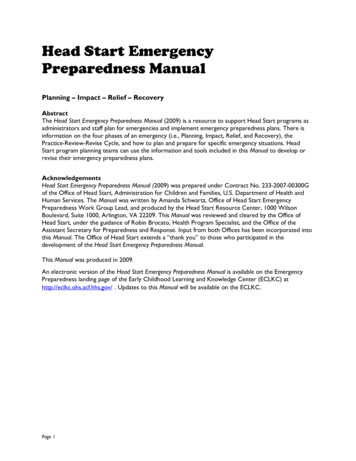
![Prekindergarten Head Start Application [Initial Screening]](/img/43/head-start-application.jpg)
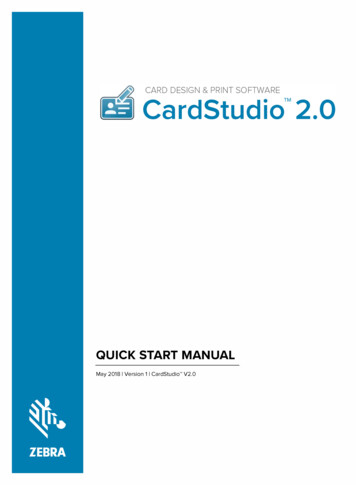
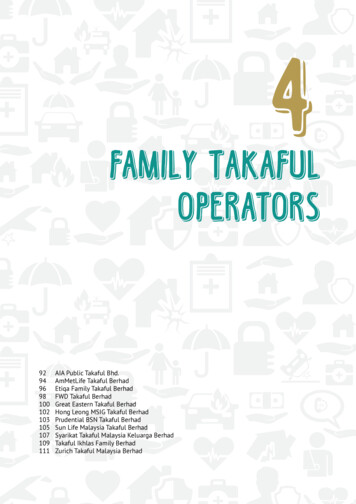

![Office 2010 Professional Plus Com Ativador Serial Keyl [EXCLUSIVE]](/img/61/office-2010-professional-plus-com-ativador-serial-keyl-exclusive.jpg)
